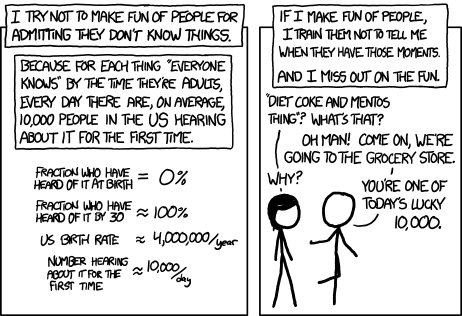In person, if the discussion is about theories and such, I’ll cheerfully describe Weinersmith’s Infantapault Theorem (or another Bad Ad-Hoc Hypethosis and cling to it just exasperatingly enough to let them teach me the difference between using information to prove a point I already want proven and properly using science to discover how the world works.
It’s super-effective!
Eh, all the arguments have been made, and all the counter-arguments have been made, and all the counter-counter arguments have been made. Is there really any point in engaging at all?
Seems you think there is
Ah, but what about the counter-counter-counter arguments?

That sort of thing just keeps escalating…
Have you noticed that people often talk about convincing someone by “winning” an argument, but in practice such “winning” seems to be mostly about bolstering self-image? Your method is super-effective because you’re encouraging the other guy to win.

If I want to show someone an error in their thinking, engaging their critical faculties, as your method does, seems more likely to succeed than an approach that engages antipathy…
Also, thanks for the BAHfest link!
Yes, there is. The point in debating science denialists isn’t to try to get them to change their minds - that’s almost never going to happen. (To be fair, it’s almost never going to happen that someone who understands science abandons it for denial either, so there is that.) The point is to reach those who witness these debates, but have yet to make up their minds. This is why the flow cart exits(*) after “Is there an audience?” evaluates false.
(* - My only problem with this flowchart is it isn’t enough like a programming flow chart for me, but the process which follows the process which should be a decision is close enough to an exit process for these purposes.)
You broke the code! Yup, that’s generally the strategy, and it seems to work pretty well, though it’s a lot easier in person because I can throw in a lot of enthusiasm, which I think helps the illusion.
Anytime! it’s a brilliant idea, isn’t it?
…
…
No it isn’t.
Yes it is.
#No it isn’t!
Oh I’m sorry, I’m in the wrong thread. Where is Getting Hit on the Head lessons?
I agree! I don’t believe in “winning” or “sides”, I think of argumentation as being a fairly neutral communications process. But my methods mostly involve asking lots of questions, and encouraging others to ask lots questions. It often doesn’t work for me, when people dismiss it as being more trouble than it is worth. Surprisingly, I find that trying to encourage people frustrates them.
As for science, I agree that it represents productive methodologies. But I am quite skeptical of the role consensus usually plays. The trick of living completely based upon evidence is that it seems to make more sense to not believe anybody, and to instead simply evaluate the latest evidence. My experience is that good scientists avoid the lazy approach of asserting that “Z has been proven”, and instead offer the far more realistic “This is our best current model of Z”. Asking people if they have a better model is more civil and better science than accusing people of not knowing “The Truth”, since this makes people defensive, and models of what is true change over time. Asking them encourages discussion, instead of ending it.
Oh, I know you believe in sides.



Did someone call for sides?
BAH? What is this? Why hadn’t I heard of this before?
I don’t know? Why hasn’t everyone? It’s one of the awesomest things!
@frauenfelder! @doctorow! Keep these people educated, dammit! 
Oh, and by the way, the ASL interpreter in the back there? She’s HILARIOUS. She had the audience laughing almost as much as Matt Inman (the Oatmeal guy) did during his introduction.
There really isn’t much need to argue with a denialist; at some time the world itself will bring the denial crashing down.

Or it won’t.
